How Water Brings People Together
The Lakes invite our collective participation in governance because they connect our shared faults and futures.
❖
By Paul Baines
8 min read
THE COMMONS
Act Now
↓While the Great Lakes inspire us with grand potential, their size stretches our capacity for care.
Together they span half the continent, eight U.S. states, two Canadian provinces, and the traditional territories of the Anishinaabek Nation and Haudenosauee Confederacy. However, the current rules to protect these waters divide what should be our shared responsibility, and reduce water to a resource, rather than the source of life.
Resource management is based on notions of control, mitigation of economic risk, and maximization of economic value. Source guardianship on the other hand respects water through humility, gratitude, interdependence, and wellbeing through the concept of the commons.
A deeper perspective
In the abstract, ‘the commons’ refers to all that we inherit, share, and pass on to future generations. They can be elemental (water, air, soil, seeds), cultural (creative expressions, technical innovations), and social (public spaces, services, and institutions). Their scale can be small (the kitchen table or a water fountain) or global (radio frequencies or the oceans). The commons, and more importantly the actions and values that define and sustain the commons — ‘commoning’ — are ancient. Rather than ownership and scarcity, commons are defined by how they are shared and generate abundance for a diversity of neighbors, including non-human life.
When looking at the connections between food, energy, health, and community and how these big systems impact the Great Lakes, a commons-based approach can deepen our perspective and spur our collective imagination for renewal. Let’s find out how.
Stolen futures, hidden costs
The problem (or tragedy) with our freshwater commons is that we lack suitable rules for governing them. Enclosing the waters within colonial boundaries for national and commercial interests is what shapes Great Lakes policy, not commoning. Our current practice of water management puts human economic needs above all else, with today’s generation feeding first and counting most.
The business practice of cost externalization discounts waste, poverty, and pollution when calculating progress and forgets economic reliance on natural systems that support life for free. With few exceptions, water pollution and privatization have become the norm for dealing with the 20% of the world’s surface freshwater found in the Great Lakes. This governance system is not broken; it was built this way.
When looking for a new solution or technological innovation for Great Lakes protection, we must consider our underlying water ethic. We live in the watershed but not with the watershed. A commons-based ethic offers a constructive vision that values connections and mutual relationships over mitigative and cumulative risk management. We can see how this might look by examining our food, water, and energy systems.
Public systems, private gains
Our food system commons — the soil, water, sunlight, and C02 that no one owns — are reduced to simple inputs when making our food. Commons bind the concepts of ‘gift’ and ‘duty’ since even the work of bees (like all these elements) are not earned or owned, but given. Seeds have been turned into intellectual property enforced through patents, even though their essence supports sharing and nurturing. And despite our intensive, profit-driven food production, obesity, malnutrition, and food waste have all increased.
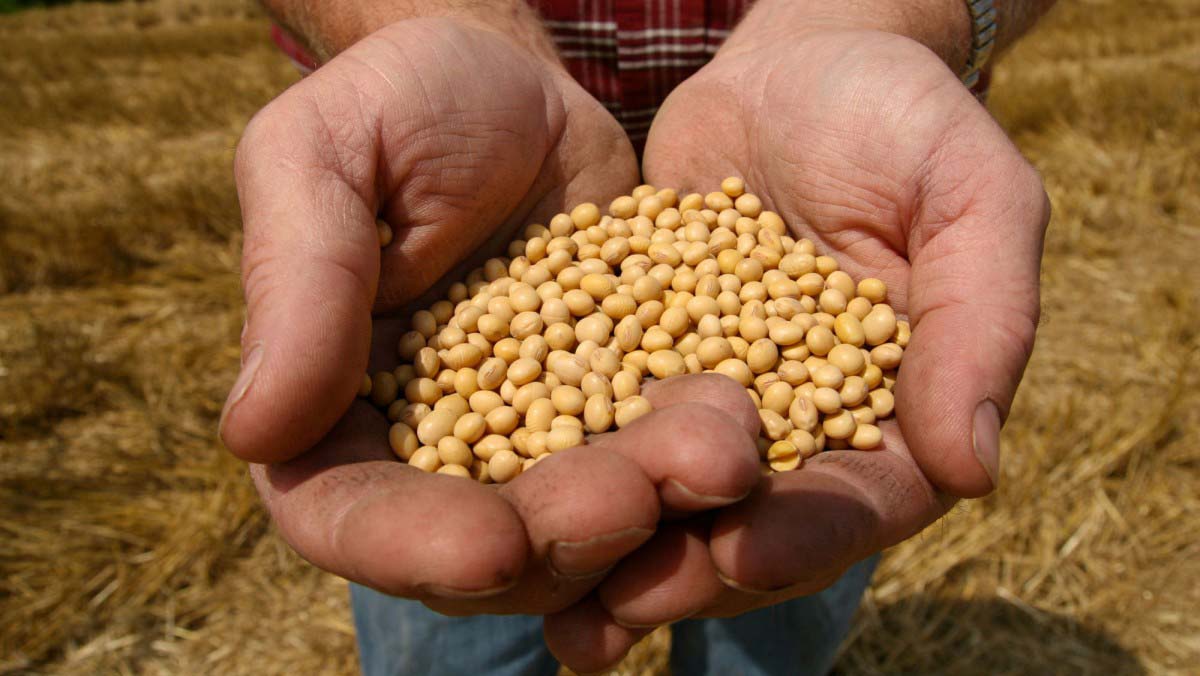
What if we governed our food systems not with inputs and outputs but spirals of reciprocal generosity and respect?
What if agriculture fed our material and spiritual expressions of a connected culture?
How can food provide our meals and also integrate our sense of place, identity, and interdependence?
• • •
Our water systems provide drinking water and treat our waste, but public investments in water pipelines and water safety divert money and trust to private profit. Water systems are failing people all across the Great Lakes because the current governance system values growth rather than gratitude and savings over generosity. These systems often poison people, dump raw sewage after heavy rains, and are broken or absent from too many communities that don’t have safe tap water. Meanwhile, aquifers, rivers, and lakes are bottled by large companies and sold to the public (falsely) as a safer alternative.
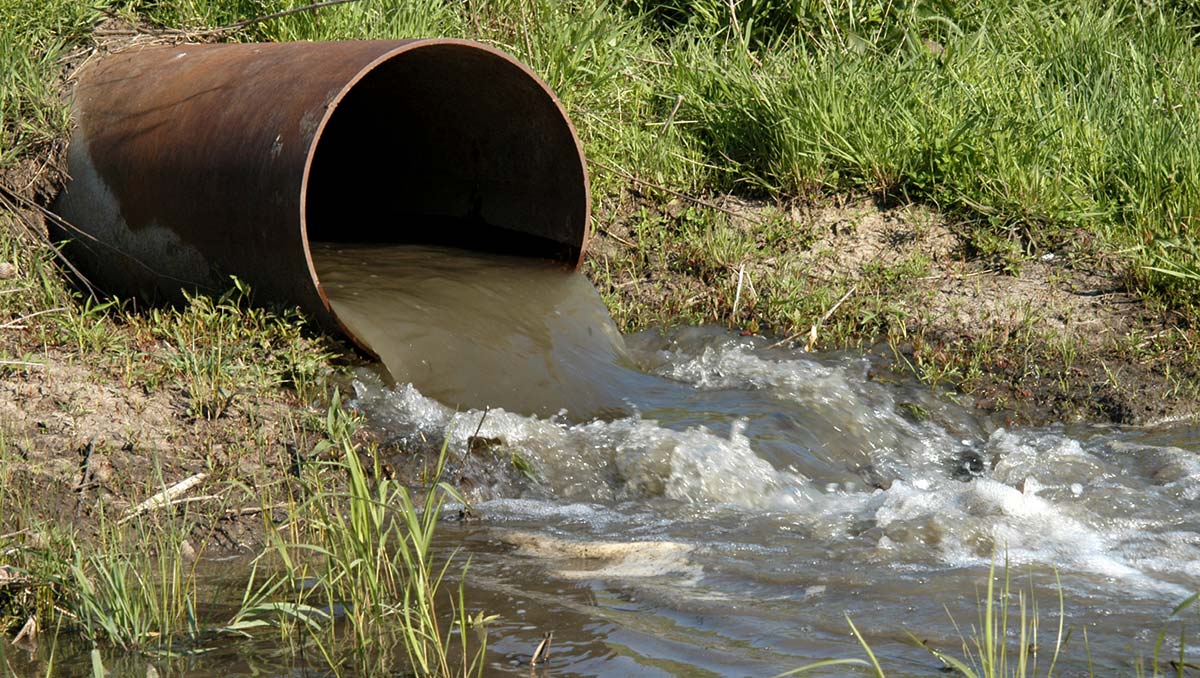
Turning public resources and free services into consumer products is a valid business strategy in our market-based economy. This is the default operating system that fails our waterways and communities. There is no community inherent in consumerism; community requires shared investments in shared systems.
A commons approach to Great Lakes governance respects watershed boundaries and not just political ones. It binds water cycles with lifecycles, rather than election cycles. Leaving the commons to be managed by governments is risky business since they are easily swayed by commercializing interests and they narrowly view a small part of the commons (a piece of the Great Lakes) as government property.
We have a water infrastructure funding gap totaling billions of dollars in the Great Lakes basin, with broke public governments and rich private investors working on solutions without proper public involvement. Yet so much of our water organizing is about reducing harm – mitigating the worst effects of a failing system – rather than healing our relationships. We don’t just want less pollution and privatization, but more alignment between money and values, humans and Mother Earth, and our collective needs and limits.
What new set of water ethics could a government demonstrate to gain your trust for improved water treatment, testing, and delivery?
How could a deeper connection to our shared waters and shared futures energize a social movement for the human right to clean and affordable water?
• • •
A final look at our energy systems — and our addiction to fossil fuels — offers many lessons in commoning. Climate change is not only a tragedy of the commons but a complete market failure. Fossil fuel energy companies receive subsidies and preferential tax treatment despite generating enormous profits from public resources with little oversight. The Line 5 pipeline through the state of Michigan is a prime example of this energy tragedy. A Canadian company owns and operates a tar sands pipeline through state lands and waters. However, these locations are not completely or legitimately owned by the state nor solely subject to the state’s approval process.
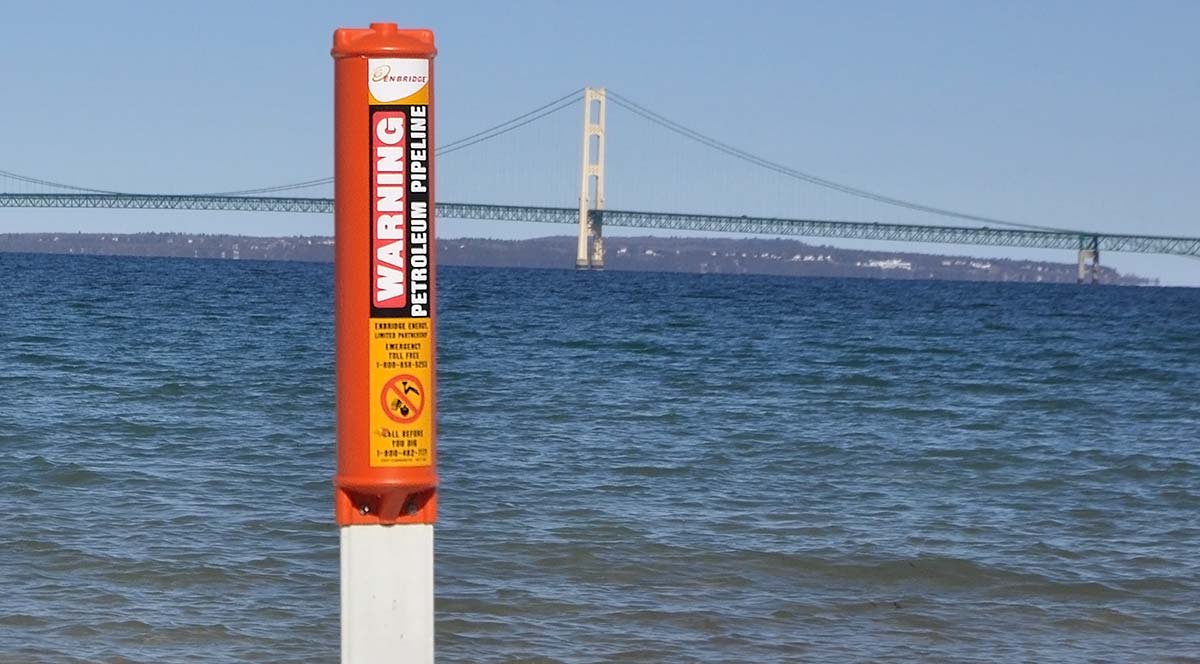
Unless Line 5 is shut down, an inevitable leak in the Straits of Mackinac will pollute lakes Michigan and Huron. This would affect not only Canadian and American lands, but the traditional lands and waters of the Anishinaabek.
Who are the energy industry “free-riders” using our shared commons for private gain?
Why do these companies continue to operate with impunity?
What rights do future generations have to a stable climate and clean water?
The Commons as a connector
A commons-based approach to water governance respects inherent ties to shared spaces, histories, and futures. Legitimized through Indigenous and western law (both national and international) the Great Lakes do not belong to Michigan, the USA, Ontario, or Canada. Calling the Great Lakes “bi-national waters” erases Indigenous nationhood rooted in this basin.
Before European invaders and traders arrived, the lakes were governed by the Dish With One Spoon wampum treaty. The Anishinaabek shared these waters in a covenant of shared protection with the nations of the Haudenosaunee confederacy (Mohawks, Oneidas, Onondagas, Cayugas, and Senecas). The treaty affirmed both the need for each member to use the spoon to take only what they need and the mutual responsibility to consider the health of the whole (the dish) when determining their needs. This is a treaty not just in concept but in practice: a dish of beaver tail soup would be shared in the large governing circles with each leader using the spoon to both consume and commune. The soup needed to feed everyone in the circle. The practice of humility, friendship, and respect holds this wampum together throughout the ages.
How can we re-create this wampum ethic in today’s Great Lakes? What would Enbridge, the company behind the Line 5 pipeline, be required to do if it honored its relationships with native and non-native people currently at risk from its pipeline? Like other elemental commons that grow our food on land, water is a gift — given to support life. How can our energy policy honor the spirit and wisdom of the Dish With One Spoon wampum and account not just for current growth and needs, but long-term livelihoods?
Commodity or relationship?
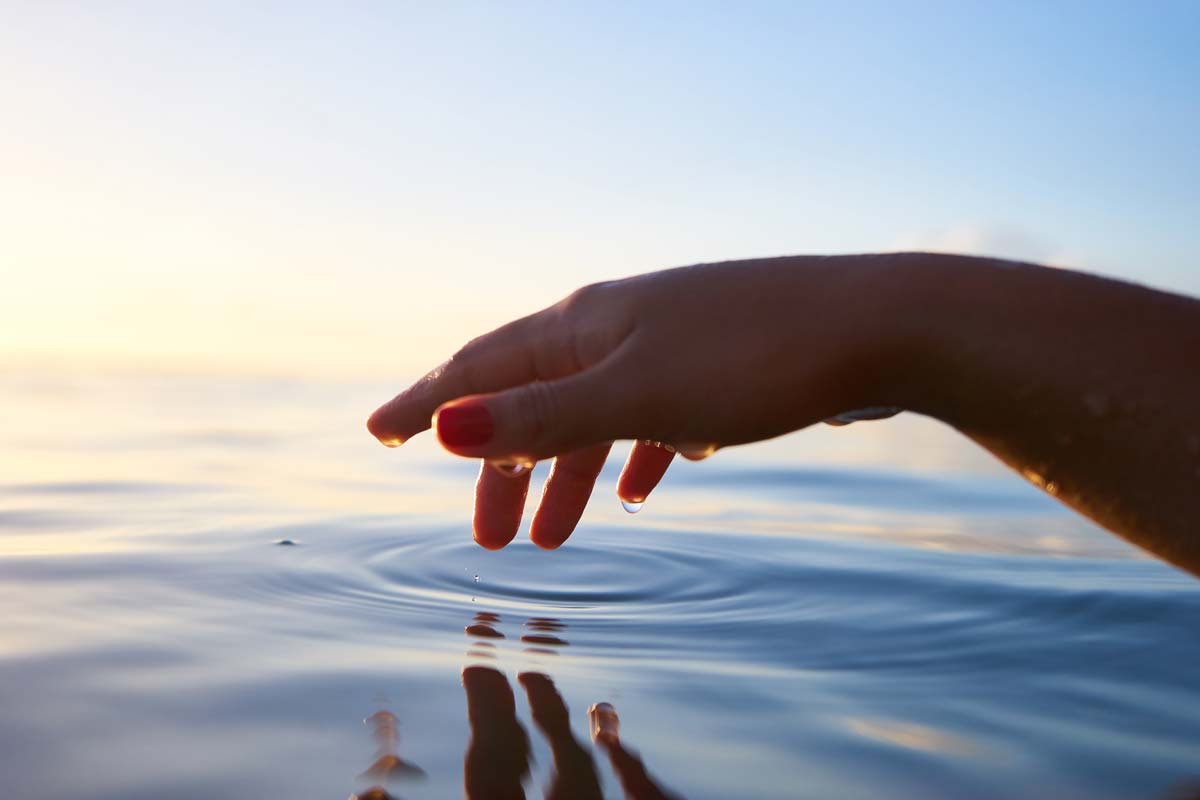
As resources and commodities, our water relations are transactional. As inputs or products, water’s exchange value is calculated by administrative forces beyond our view. Protecting our commons invites a more intimate set of agreements, since water is also a source of life, an agent of renewal, and a marker of identity and home.
It takes 350 years for all the water to cycle through the Great Lakes basin. Holding not just water but history, the Great Lakes challenge us to practice multi-generational governance that learns from past wrongs and leans into a new horizon for shared guardianship.
How do we relate to water through place and community? How can we step into roles beyond electoral citizen and economic consumer and practice being a good ancestor, an honorable treaty partner, and a responsible watershed being?
What can we do?
40 million people share the Great Lakes today, and many more will depend on them in the future. The waters don’t belong to us, but we have the prime responsibility to protect them. The circle of gratitude spirals beyond one political boundary, one generation, or one water issue. Our challenge to be a good commoner — to be a good ancestor — is re-connecting with this ancient set of ethics and practices.
→ Reclaim the Public Trust, Honor the Treaties
The Public Trust doctrine defends the collective ownership of the commons through the powers of the state. Federal, state, and provincial governments are needed to act as Trustees, not owners of water. Read more about how public trust principles can protect water in perpetuity.
Recognize the Indigenous territories at your water events and integrate this land acknowledgment with how you are reconciling colonial damage and committing to respectful water protection and relations. An introduction to Indigenous water governance in the Great Lakes is a good start.
Using the Dish With One Spoon wampum and the Public Trust doctrine, we can create actions, rules, and institutions which embody the spirit of commoning.
→ Sign the Great Lakes Commons Charter
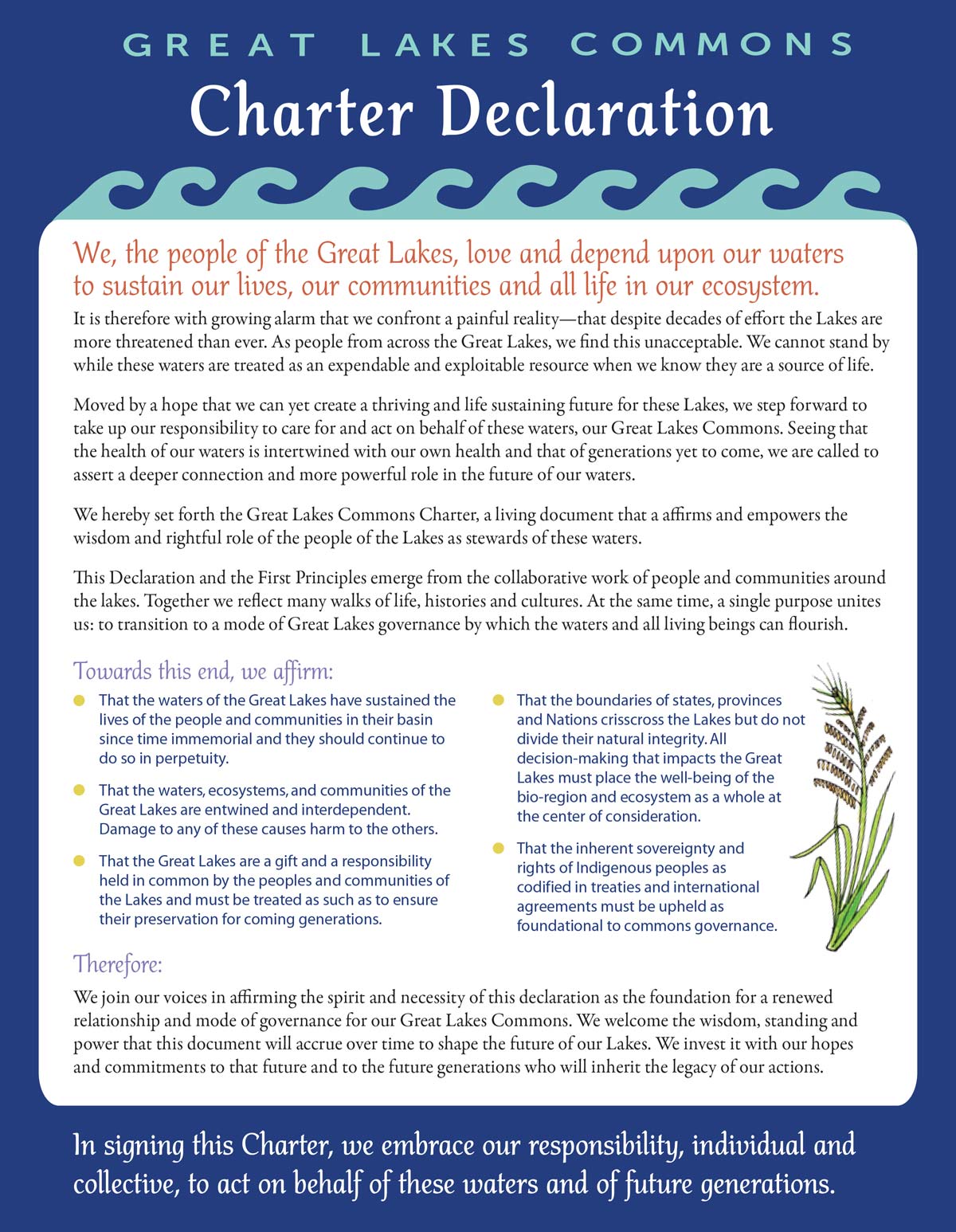
Out of our love for the Great Lakes and our responsibilities to future generations, there is a new agreement and vision for a renewed relationship with the Great Lakes. Add your name and commitment to the Great Lakes Commons Charter and join a growing community united across geography, ancestry, and issues.
Water is the first medicine and can heal our exploitive relationships with mother earth and each other. The impacts of pollution and privatization are symptoms of this broken relationship and the Commons Charter sets forth a restorative path for the future.
→ Add to the Commons Map
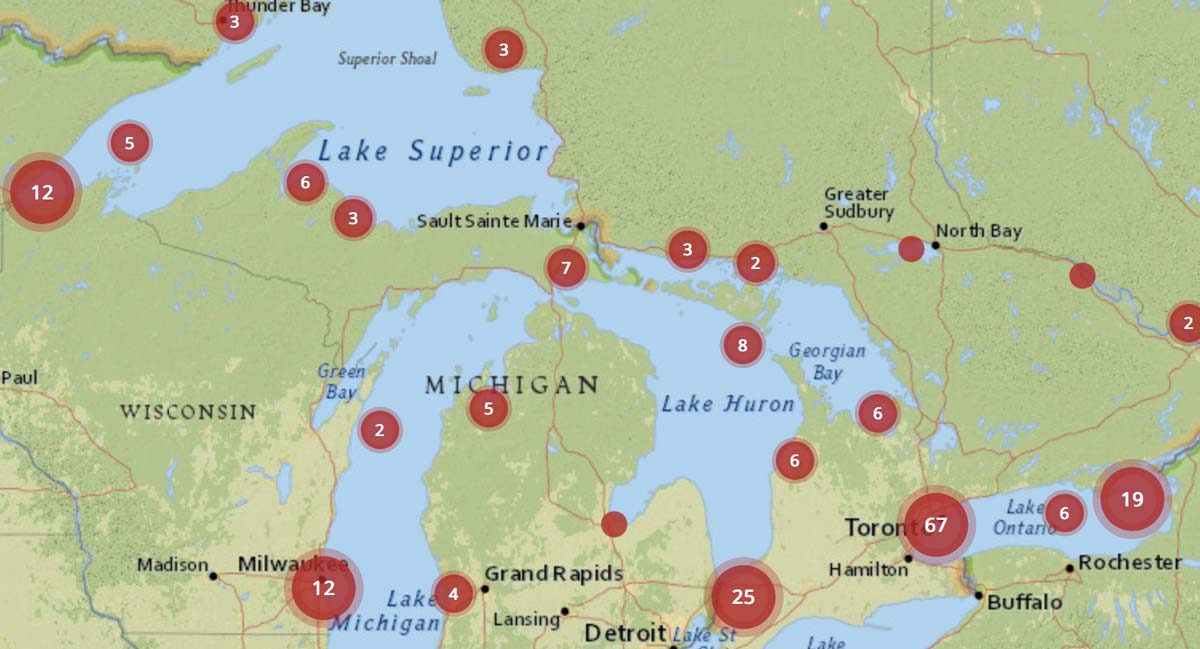
You can also help build a story-commons by adding your voice to the Great Lakes Commons Map. Using text, photos, or video, you can share your ideas about what is healing or harming these waters. The map promotes the spirit of belonging, connecting the Lakes' 40 million inhabitants from different nations and with different needs.
Commons Charter Toolkit
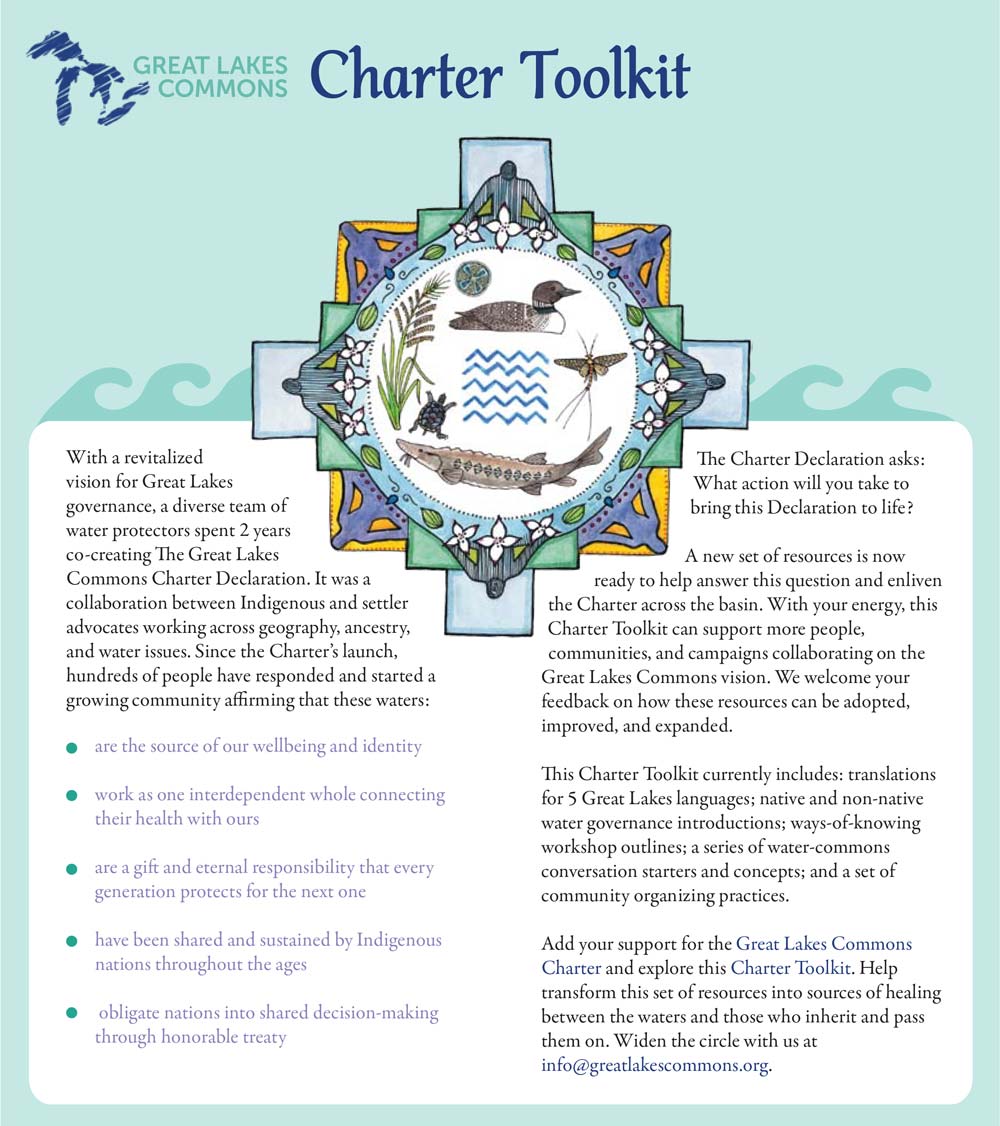
If you'd like more learning and organizing resources, you can download, share, and use parts of the Commons Charter Toolkit. It has examples and guides for:
- Connecting human & water body health
- Working at a bioregional scale
- Indigenizing water governance
- Starting new commons conversations about bottled water
- Building unity with the Commons Charter in 5 Great Lakes languages
- Sharing visioning & organizing strategies
- Teaching water ethics & gratitude
 Freshwater Stories
Freshwater Stories